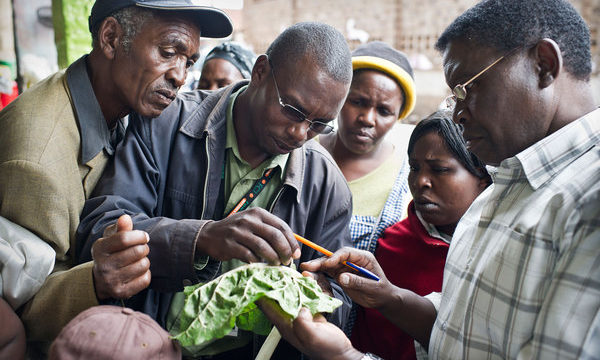 In the first post in this series about making the most of the Plantwise knowledge bank , we wrote about how to effectively search for content. I’m now here to tell you that we’d barely scratched the surface of smart searching! In this post we will delve further into effective searching, covering Boolean searches, word stemming and metadata.
In the first post in this series about making the most of the Plantwise knowledge bank , we wrote about how to effectively search for content. I’m now here to tell you that we’d barely scratched the surface of smart searching! In this post we will delve further into effective searching, covering Boolean searches, word stemming and metadata.
Boolean operators
The knowledge bank makes use of what is known as “Boolean” searches which involves the use of AND / OR / NOT to make a search more specific.
- The ‘AND’ operator links phrases or single words, e.g. Kenya AND maize. This will retrieve content that is relevant to Kenya and maize, such as a factsheet on a stem borer that infests maize and is known to be present in Kenya.
- The ‘OR’ operator allows you to search for content that contains one or more of a number of search terms, e.g. “Fusarium blight” OR “Maize lethal necrosis disease” OR “Maize streak virus”. This search will retrieve content about these diseases of maize. Note the use of double quotation marks enclosing phrases so that individual phrases (in this case, the disease names) are searched for.
- The ‘NOT’ operator excludes terms from your search, e.g. “bananas” NOT “banana xanthomonas wilt”. Using this search string, will retrieve content on bananas, but exclude search results on banana xanthomonas wilt.
Multiple Boolean operators
You can also use more than one type of operator in a single search. Brackets specify the order of the search, working from the inner brackets, and moving outwards. In the example below then ‘OR’ part is done first.
- To search for diseases on potatoes or cowpeas or peppers, but exclude content on blight, use ((potatoes OR cowpeas OR peppers) AND diseases) NOT blight.
Word-stemming
Word stemming means that a search for weeds will also find content on weeding and weeds and weed, by default. To search for a term without word stemming, use double quotes, e.g. “weeding”.
Metadata
All content in the Knowledge Bank has been indexed with key terms to make it easy to retrieve. Keywords such as crops, pests and can be typed into the search box and used with no prefix. However, it’s also possible to query specific fields, including the following:
- aa = Author affiliation, e.g. aa:India (content written in India)
- et = English title
- ft = Foreign title
- cp = Country of publication
- yr = Year of publication
Multiple fields can be queried in the same search. For example, to find content written in India and published in 2014 use: (aa:india) and (yr:2014).
For more information on the content held in the knowledge bank and how to retrieve it, visit our site search help page.
Related News & Blogs
Making the most of the knowledge bank: How to enhance your country’s content
Contributed by Léna Durocher-Granger and Kate Dey Are you perhaps a coffee expert, a research scientist, post-graduate student in crop management, an extension officer working at the Ministry of Agriculture? Would you like to contribute to the plant he…
28 September 2016

